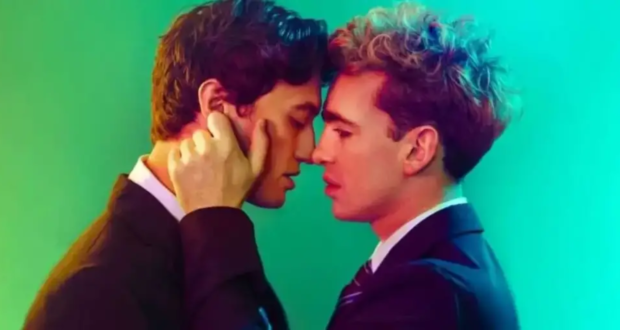BARE by name, bare by nature. A disappointing attempt at a coming of age odyssey is reduced to a one dimensional missed opportunity.Summary
Rating
Poor
BARE is described as an “electric and tragic coming-of-age musical”, chronicling a group of students at an American Catholic boarding school as they navigate self-identity, sexuality and faith, both in their friendships and in God.
The Good:
The story follows two star-crossed lovers, Jason (Jordan Luke Gage) and Peter (Laurie Kynaston), hiding their clandestine relationship. When Peter suggests that the liaison should evolve a rift is caused between them, setting off a chain of events with devastating consequences.
The tale explores the difficulties of being an adolescent trying to find self-authenticity within a world saturated with intolerance. When the students stage Romeo and Juliet the Shakespearean tragedy acts both as a mirror, highlighting issues that, unfortunately, many young people still face today, and as a foreboding parallel narrative of the fate of the two protagonists.
Laudably, great effort is made to create a vibrant, inclusive, multi-ability ensemble. With solid performances by Katie Ramshaw as Nadia, the upbeat, engaging Sister Chantelle (Claudia Kariuki) and Peter’s endearing, relatable mother Claire (Cassidy Janson), the production does well at showcasing these talented entertainers.
The Bad:
The first twenty minutes is tricky to follow. Are they at a religious institution or Bible camp? Andrew Exeter’s sparse set design provides little indication of location other than the small stained glass image from Michelangelo’s Creation of Adam, so the lyrics and dialogue must offer context. Unfortunately, this proves incredibly difficult as the score is often louder than the performers and microphone failures meant that much of the dialogue was reduced to a muted muffle.
While some scenes look well-rehearsed, others seem clumsy and are uncomfortable to watch. During a scene where the students socialise, one of them breaks out into an extended, difficult to understand rap as his contemporaries awkwardly bop to the music behind him. The combination of unreliable lighting cues, technical issues and fluctuating American accents and performance levels make for a very distracting and inconsistent viewing experience.
The Ugly.
BARE features an array of topical and deeply relevant issues, yet it fails to fully address them in any meaningful detail. The structure and plot feel disjointed, rudimentary and are saturated with predictability. Poignant and emotional scenes are reduced to exaggerated and contrived portrayals that undermine the potential for what could be a powerful and moving story.
Adolescent plays like Spring Awakening and even the featured Romeo and Juliet work due to their complex narrative and nuanced depictions; attributes which are sorely lacking in BARE, making it more comparable to a GCSE production than a professionally dramaturged script.
Though an inclusive cast, this aspect is undermined by subpar writing riddled with reductive clichés. A student performing rap is also the supplier of illegal substances. Sister Chantelle traverses between a sassy, no nonsense nun and the all-wisdom-giving-oracle (aka the ‘magical negro’). In the number ‘God Don’t Make No Trash’ she consoles Peter and in a show of solidarity proudly states “…inside every gay man is a black woman!” which garners cheers from the audience; supposedly paying homage to the undeniable influence black women have had within LGBTQ+ culture dating back to the Ballroom scene and beyond. Yet the irony and insincerity of this acknowledgment is loudly illuminated by diverse characters being condensed into comical tropes. Whether an oversight or benevolent ignorance, this one-dimensional writing actually reinforces the negative stereotypes that inclusive casting is designed to eliminate.
This is a production filled with missed opportunities. Creators Damon Intrabartolo and Jon Hartmere’s attempts at tackling these challenging themes is commendable, but with a story steeped in so many troubling issues it falls far short of being the teenage epic it strives to be.
BARE has and continues to garner a dedicated stan-base, no doubt aided by its star-studded cast. Let’s hope in its next iteration the show addresses its limiting factors and blossoms into a production less akin to its title.
Score by: Damon Intrabartolo
Lyrics by: Jon Hartmere
Produced by: Lambert Jackson and Positive Sum.
Musical Director by: Adam Hoskins
Set & Lighting Design by: Andrew Exeter
Bare played as a one off performance.
 Everything Theatre Reviews, interviews and news for theatre lovers, London and beyond
Everything Theatre Reviews, interviews and news for theatre lovers, London and beyond



